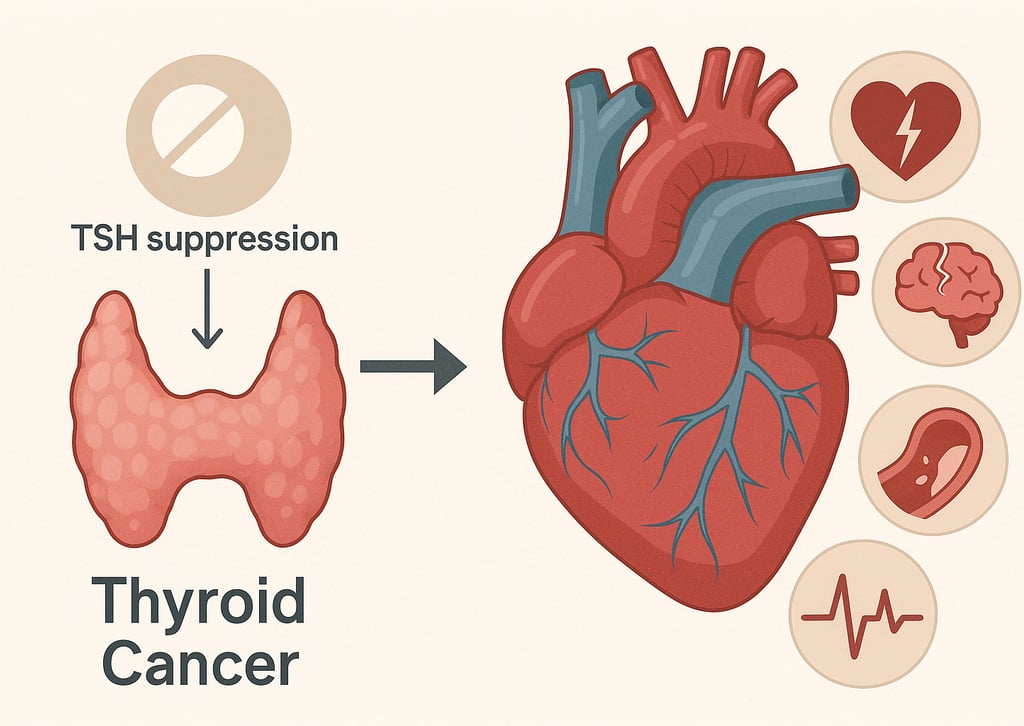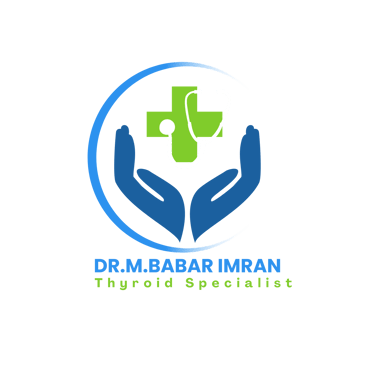Thyroid Cancer and Heart Disease: Understanding the Link
People with differentiated thyroid cancer (DTC) face a higher risk of heart disease compared to the general population. Problems may include heart attack, stroke, irregular heartbeat, and blocked heart arteries. U.S. data shows that heart disease is the leading cause of non-cancer deaths in thyroid cancer patients, responsible for about one in five such deaths. A key reason is long-term thyroid stimulating hormone (TSH) suppression therapy, which helps prevent cancer recurrence but puts extra strain on the heart. This increases the risk of cardiovascular disease by about 25%, with even higher risks for patients whose cancer has spread. By contrast, radioactive iodine (RAI) therapy has no major effect on heart risks. In summary, thyroid cancer itself is not usually fatal, but heart disease is a major concern for survivors. Regular check-ups with a thyroid specialist, along with healthy lifestyle habits—balanced diet, exercise, and control of blood pressure and cholesterol—are vital, especially for those on long-term TSH suppression.
Dr.Muhammad Babar Imran
9/30/20251 min read


Thyroid Cancer and Heart Diseases
Research has shown that people with differentiated thyroid cancer (DTC) have a higher chance of developing heart problems compared to the general population. These problems can include heart attacks, stroke, irregular heartbeat (atrial fibrillation), and blocked heart arteries (coronary artery disease).
In fact, large databases in the U.S. have found that heart disease is the leading cause of non-cancer deaths among thyroid cancer patients, making up about 1 in 5 deaths not caused by cancer. Overall, the risk of dying from heart disease is about 60% higher than in people without thyroid cancer.
One important reason is the thyroid stimulating hormone (TSH) suppression therapy many thyroid cancer patients receive. This treatment helps lower the chance of cancer returning, but it may also increase the strain on the heart. Studies have shown that patients on long-term TSH suppression have a 25% higher risk of cardiovascular disease, and those with advanced cancer (spread to other parts of the body) may have an even greater risk.
On the other hand, radioactive iodine (RAI) treatment, which is often used in thyroid cancer, does not seem to increase or decrease heart risks.
In short:
Thyroid cancer itself isn’t usually fatal, but heart disease is a major concern for survivors.
TSH suppression therapy is likely the main factor linked to these risks.
Regular heart check-ups with Thyroid Specialist and healthy lifestyle changes (diet, exercise, controlling blood pressure and cholesterol) are very important for thyroid cancer patients, especially those on long-term TSH suppression.
تھائی رائیڈ کینسر اور دل کی بیماریاں
تحقیقات سے یہ بات سامنے آئی ہے کہ ڈفرینشی ایٹڈ تھائیرائیڈ کینسر (DTC) کے مریضوں میں عام لوگوں کے مقابلے میں دل کی بیماریوں کا خطرہ زیادہ ہوتا ہے۔ ان بیماریوں میں شامل ہیں:
دل کا دورہ (ہارٹ اٹیک)
فالج (اسٹروک)
دل کی بے قاعدہ دھڑکن (ایٹریل فیبریلیشن)
دل کی شریانوں کا بند ہونا (کورونری آرٹری ڈیزیز)
امریکہ میں کیے گئے بڑے ڈیٹا بیس مطالعات کے مطابق، تھائیرائیڈ کینسر کے مریضوں میں کینسر کے علاوہ سب سے زیادہ اموات دل کی بیماریوں سے ہوتی ہیں۔ تقریباً ہر 5 میں سے 1 موت کینسر کے بجائے دل کی بیماری کی وجہ سے ہوتی ہے۔ مجموعی طور پر، دل کی بیماری سے مرنے کا خطرہ ایسے مریضوں میں عام آبادی کے مقابلے میں 60% زیادہ ہے۔
ایک بڑی وجہ وہ علاج ہے جسے تھائیرائیڈ اسٹیمولیٹنگ ہارمون (TSH) سپریشن تھراپی کہتے ہیں۔ یہ علاج کینسر کے دوبارہ آنے کے امکانات کو کم کرتا ہے، لیکن یہ دل پر دباؤ بھی بڑھا سکتا ہے۔ مطالعات سے پتا چلا ہے کہ لمبے عرصے تک TSH سپریشن لینے والے مریضوں میں دل کی بیماری کا خطرہ 25% زیادہ ہو جاتا ہے۔ جن مریضوں میں کینسر جسم کے دوسرے حصوں میں پھیل گیا ہو، ان میں یہ خطرہ اور بھی بڑھ جاتا ہے۔
دوسری طرف، ریڈیو ایکٹیو آئیوڈین (RAI) تھراپی جو اکثر تھائیرائیڈ کینسر کے علاج میں دی جاتی ہے، دل کی بیماری کے خطرے کو نہ تو بڑھاتی ہے اور نہ ہی کم کرتی ہے۔
خلاصہ:
تھائیرائیڈ کینسر براہِ راست جان لیوا نہیں ہوتا، لیکن ان مریضوں کے لیے دل کی بیماری ایک بڑی تشویش ہے۔
TSH سپریشن تھراپی ان خطرات کی سب سے اہم وجہ سمجھی جاتی ہے۔
مریضوں کے لیے ضروری ہے کہ وہ باقاعدہ تھائیرائیڈ کے ماہر ڈاکٹر سے معائنہ کرواتے رہیں تاکہ علاج اور TSH کی سطح مناسب طریقے سے کنٹرول ہو سکے۔
ساتھ ہی مریضوں کو چاہیے کہ وہ صحت مند طرزِ زندگی اپنائیں (جیسے متوازن غذا، ورزش، بلڈ پریشر اور کولیسٹرول کا کنٹرول)۔
خاص طور پر وہ مریض جو لمبے عرصے تک TSH سپریشن تھراپی پر ہیں، اُنہیں زیادہ محتاط رہنے کی ضرورت ہے۔

Contact
Get in touch for inquiries or appointments.
Connect
muhammadbabarimran@yahoo.com
03001551966
© 2025. All rights reserved. Dr.Muhammad Babar Imran
